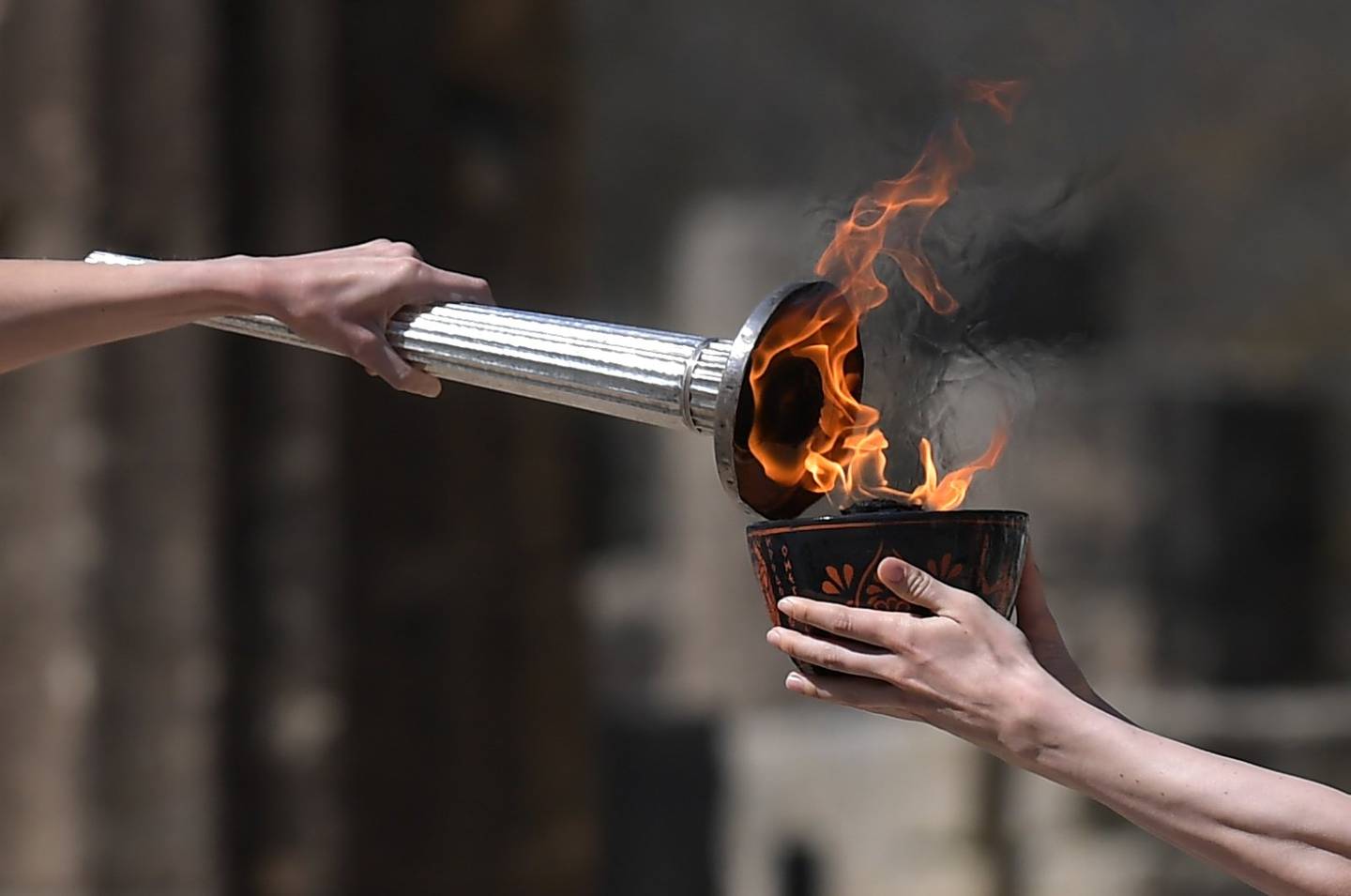Từ Vựng Bài Đọc The Olympic Torch
Xem danh sách từ vựng Vocabulary của đề The Olympic Torch được lấy từ cuốn Actual Test 6 - Test 4-Passage 3. Phần từ vựng IELTS của bài chứa bộ từ, bao gồm phát âm, định nghĩa, ví dụ và cả hình ảnh sẽ giúp thí sinh IELTS dễ hiểu nội dung của đề bài hơn
torch
/tɔrʧ/
(noun). a small light that is held in the hand and usually gets its power from batteries
Committee
/kəˈmɪti/
(noun). a group of people appointed for a specific function, typically consisting of members of a larger group
withstand
/wɪθˈstænd/
(verb). to be strong enough not to be damaged
severe
/səˈvɪr/
(adj). (of something bad or undesirable) very great; intense.
aesthetic
/ɛˈsθɛtɪk/
(adj). appreciation with beauty
practical
/ˈpræktəkəl/
(adj). connected with real situations rather than with ideas or theories
value
/ˈvælju/
(verb). estimate the monetary worth of (something)
purchase
/ˈpɜrʧəs/
(verb). to buy something
relay
/riˈleɪ/
(noun). a group of people or animals engaged in a task or activity for a fixed period of time and then replaced by a similar group
treasurable
/ˈtrɛʒərəbl/
(adj). Highly valued; prized
souvenir
/ˌsuvəˈnɪr/
(noun). a thing that you buy and/or keep to remind yourself of a place, an occasion or a holiday/vacation
liquid
/ˈlɪkwəd/
(noun). a substance that flows freely and is not a solid or a gas, for example water or oil
promote
/prəˈmoʊt/
(verb). Support or actively encourage (a cause, venture, etc.); further the progress of
security
/sɪˈkjʊrəti/
(noun). the state of being free from danger or threat.
appearance
/əˈpɪrəns/
(noun). an act of becoming visible or noticeable; an arrival.
environmentally
/ɪnˌvaɪrənˈmɛntəli/
(adv). in a way that relates to the natural world and the impact of human activity on its condition
substance
/ˈsʌbstəns/
(noun). A particular kind of matter with uniform properties.
flame
/fleɪm/
(noun). a hot bright stream of burning gas that comes from something that is on fire
bright
/braɪt/
(adj). giving out or reflecting much light; shining.
detrimental
/ˌdɛtrəˈmɛntəl/
(adj). harmful
slender
/ˈslɛndər/
(adj). (of people or their bodies) thin in an attractive or elegant way
steel
/stil/
(noun). a hard, strong, gray or bluish-gray alloy of iron with carbon and usually other elements, used extensively as a structural and fabricating material
rod
/rɑd/
(noun). long straight piece of wood, metal or glass
circular
/ˈsɜrkjələr/
(adj). Having the form of a circle.
platform
/ˈplætˌfɔrm/
(noun). A raised level surface on which people or things can stand.
jet
/ʤɛt/
(verb). Spurt out in jets
inscribe
/ɪnˈskraɪb/
(verb). marked with characters.
token
/ˈtoʊkən/
(noun). something that is a symbol of a feeling, a fact, an event, etc.
potentially
/pəˈtɛnʃəli/
(adv). With the capacity to develop
risky
/ˈrɪski/
(adj). Full of the possibility of danger
ignite
/ɪgˈnaɪt/
(verb). Catch fire or cause to catch fire.
sear
/sɪr/
(verb). to burn the surface of something suddenly
theme
/θim/
(noun). the subject of a talk, a piece of writing, a person's thoughts, or an exhibition; a topic
echo
/ˈɛkoʊ/
(verb). (of a sound) be repeated or reverberate after the original sound has stopped
base
/beɪs/
(verb). Use (something specified) as the foundation or starting point
accommodate
/əˈkɑməˌdeɪt/
(verb). Fit in with the wishes or needs of.
tank
/tæŋk/
(noun). a storage chamber for either liquid or gas
brass
/bræs/
(noun). A yellow alloy of copper and zinc
valve
/vælv/
(noun). A device for controlling the passage of fluid or air through a pipe, duct, etc.,
squeeze
/skwiz/
(verb). to press something firmly, especially with your fingers
pressurised
/ˈprɛʃəˌraɪzd/
(adj). having artificially raised pressure.
ascend
/əˈsɛnd/
(verb). Go up or climb
modify
/ˈmɑdəˌfaɪ/
(verb). Make partial or minor changes to (something)
handle
/ˈhændəl/
(noun). the part by which a thing is held, carried, or controlled.
petroleum
/pəˈtroʊliəm/
(noun). mineral oil that is found under the ground or the sea and is used to produce petrol/gas, paraffin, diesel oil, etc.
burner
/ˈbɜrnər/
(noun). the part of a cooker, light, etc. that produces flame or heat
adopt
/əˈdɑpt/
(verb). Take on or assume (an attitude or position)
host
/hoʊst/
(verb). act as host at (an event) or for (a television or radio program).
cauldron
/ˈkɑldrən/
(noun). A large metal pot with a lid and handle, used for cooking over an open fire.
altar
/ˈɔltər/
(noun). a type of table used in ceremonies in a Christian church or in other religious buildings
ritual
/ˈrɪʧuəl/
(noun). A religious or solemn ceremony consisting of a series of actions
devote
/dɪˈvoʊt/
(verb). to give your time or effort completely to something you believe in or to a person, or to use a particular amount of time or energy doing something
abstract
/ˈæbstrækt/
(adj). disassociated from any specific instance
draft
/dræft/
(noun). a piece of text, a formal suggestion, or a drawing in its original state, often containing the main ideas and intentions but not the developed form
solid
/ˈsɑləd/
(adj). Firm and stable in shape; not liquid or fluid.
gunpowder
/ˈgʌnˌpaʊdər/
(noun). An explosive
olive
/ˈɑləv/
(noun). A small oval fruit
flammable
/ˈflæməbəl/
(adj). easily set on fire.
hazardous
/ˈhæzərdəs/
(adj). risky and dangerous
exterior
/ɪkˈstɪriər/
(adj). outside of sth
unstable
/ənˈsteɪbəl/
(adj). Likely to give way; not stable.
internal
/ɪnˈtɜrnəl/
(adj). connected with the inside of something
pilot
/ˈpaɪlət/
(adj). done as an experiment or test before introducing something more widely.
bump up
/bʌmp ʌp/
(verb). increase something.


